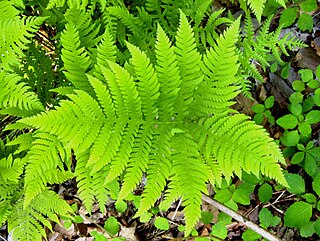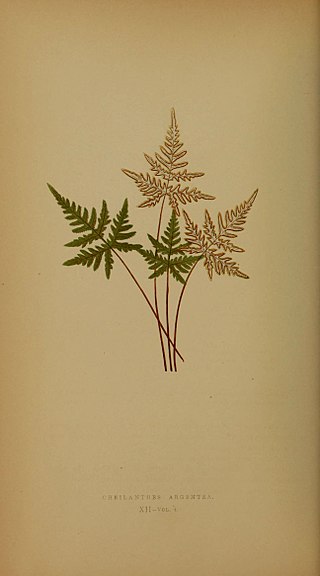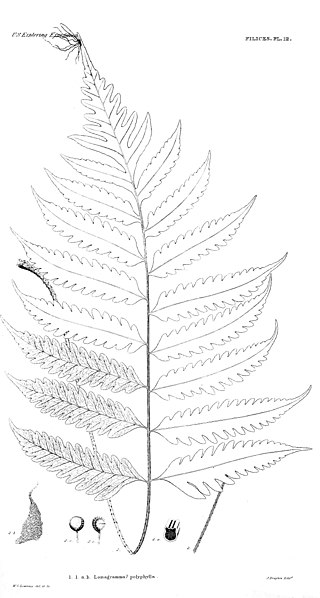
Thelypteridaceae is a family of about 900 species of ferns in the order Polypodiales. In the Pteridophyte Phylogeny Group classification of 2016, it is placed in the suborder Aspleniineae. Alternatively, the family may be submerged in a very broadly defined family Aspleniaceae as the subfamily Thelypteridoideae.

Phegopteris is a genus of ferns in the family Thelypteridaceae, subfamily Phegopteridoideae, in the Pteridophyte Phylogeny Group classification of 2016. They are known collectively as the beech ferns. Species are native to Asia, North America and Europe.

Cyrtomium is a genus of about 35 species of ferns in the family Dryopteridaceae, subfamily Dryopteridoideae, according to the Pteridophyte Phylogeny Group classification of 2016. Species are native to Asia, Africa, and the Pacific Ocean islands (Hawaii). It is very closely related to the genus Polystichum, with 2016 research suggesting it should be included in a clade sister to Polystichum s.s.

Microsorum is a genus of ferns in the family Polypodiaceae, subfamily Microsoroideae, according to the Pteridophyte Phylogeny Group classification of 2016 (PPG I). The species are tropical. Like most ferns, they grow from rhizomes, rather than roots. The genus name is often misspelled "Microsorium" or "Microsoreum". It includes some species that are lithophytic rheophytes.

Aleuritopteris is a genus of ferns in the Cheilanthoideae subfamily of the Pteridaceae. As with some other genera of the Cheilanthoideae, molecular phylogenetic studies have suggested that it is not monophyletic, and so may need to be circumscribed differently in future.

Arachniodes is a fern genus in the family Dryopteridaceae, subfamily Dryopteridoideae, in the Pteridophyte Phylogeny Group classification of 2016. A number of species in this genus are known as "holly ferns".

Bolbitis is a genus of ferns in the family Dryopteridaceae, subfamily Elaphoglossoideae, in the Pteridophyte Phylogeny Group classification of 2016.

Thelypteris is a genus of ferns in the subfamily Thelypteridoideae, family Thelypteridaceae, order Polypodiales. Two radically different circumscriptions of the genus are in use as of January 2020. In the Pteridophyte Phylogeny Group classification of 2016, the genus is a very small one with about two species. In other approaches, the genus is the only one in the subfamily Thelypteridoideae, and so includes between 875 and 1083 species.
Cyclogramma is a genus of ferns in the family Thelypteridaceae, subfamily Thelypteridoideae, in the Pteridophyte Phylogeny Group classification of 2016. Other sources sink Cyclogramma into a very broadly defined genus Thelypteris.

Christella is a genus of around 70-80 species of ferns in the subfamily Thelypteridoideae of the family Thelypteridaceae in the Pteridophyte Phylogeny Group classification of 2016. Other sources sink Christella into a very broadly defined genus Thelypteris. The genus was named after Konrad H. Christ, a Swiss botanist. The distribution of these plants is mostly in the tropics and sub tropical areas. An Australian example is C. dentata.

Cyclosorus is a genus of ferns in the family Thelypteridaceae, subfamily Thelypteridoideae, in the Pteridophyte Phylogeny Group classification of 2016. Other sources sink Cyclosorus into a very broadly defined genus Thelypteris, or expand the genus to include other genera which PPG I keeps separate. Thus the online Flora of China suggests there are about 250 species compared to the two species suggested in PPG I.

Paragymnopteris is a genus of ferns in the subfamily Cheilanthoideae of the family Pteridaceae. Species of Paragymnopteris are native to the Old World.

Macrothelypteris is a genus of ferns in the family Thelypteridaceae, subfamily Phegopteridoideae, in the Pteridophyte Phylogeny Group classification of 2016. The genus name means 'large Thelypteris'.
Stegnogramma is a genus of ferns in the subfamily Thelypteridoideae of the family Thelypteridaceae in the Pteridophyte Phylogeny Group classification of 2016. Other sources sink Stegnogramma into a very broadly defined genus Thelypteris.

Coryphopteris is a genus of ferns in the family Thelypteridaceae, subfamily Thelypteridoideae, in the Pteridophyte Phylogeny Group classification of 2016.
Pleocnemia is a genus of ferns in the family Dryopteridaceae, subfamily Elaphoglossoideae, in the Pteridophyte Phylogeny Group classification of 2016.
Teratophyllum is a genus of ferns in the family Dryopteridaceae, subfamily Elaphoglossoideae, in the Pteridophyte Phylogeny Group classification of 2016. The genus is native to Malesia.

Lomagramma is a genus of ferns in the family Dryopteridaceae, subfamily Elaphoglossoideae, in the Pteridophyte Phylogeny Group classification of 2016.

Parapolystichum is a genus of ferns in the family Dryopteridaceae, subfamily Elaphoglossoideae, in the Pteridophyte Phylogeny Group classification of 2016. The genus is mainly native to the tropics, although its range extends to southeastern Australia.

Lepisorus is a genus of ferns in the family Polypodiaceae, subfamily Microsoroideae, according to the Pteridophyte Phylogeny Group classification of 2016 (PPG I).
















